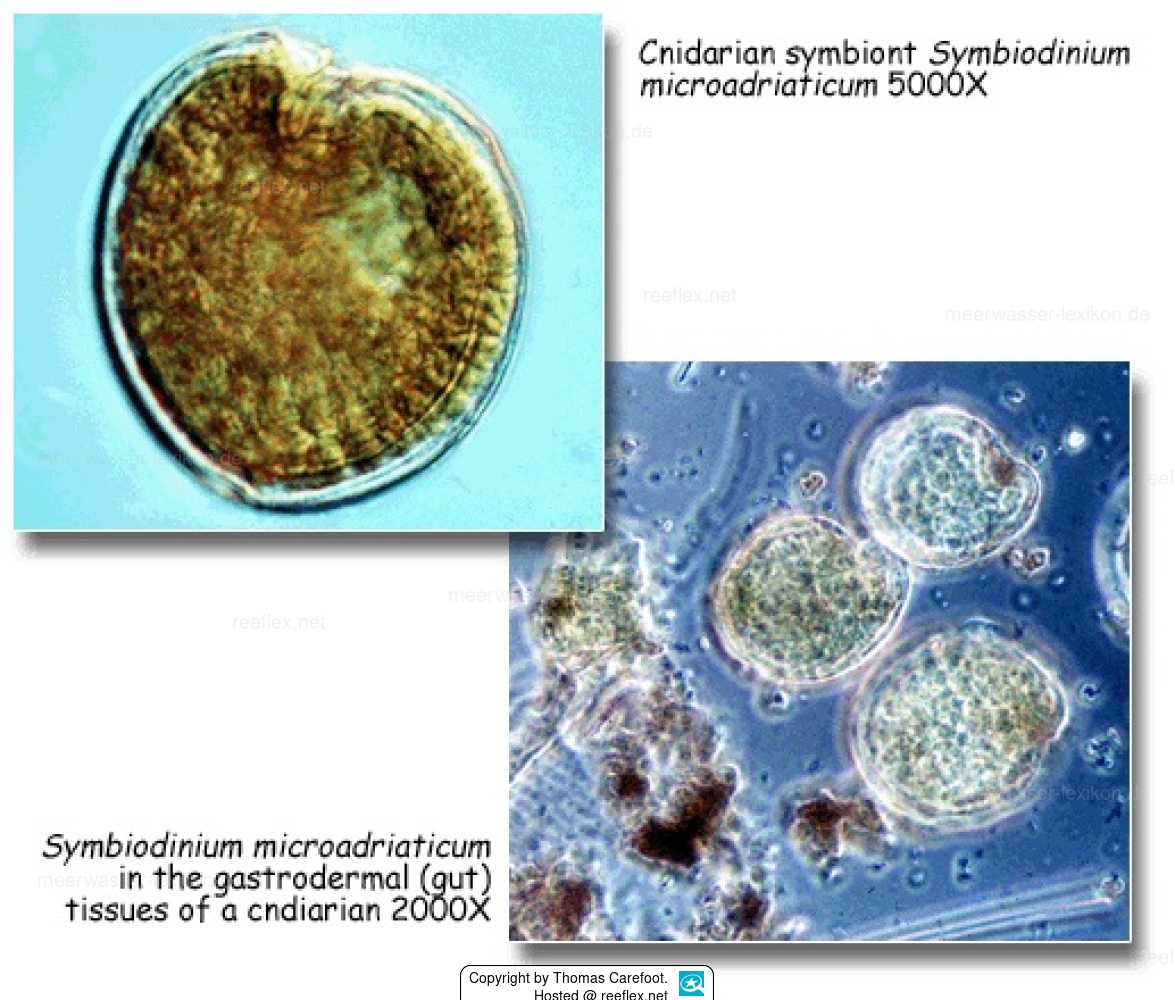Info
We are very grateful for the first photo of Symbiodinium microadriaticum to Prof. Dr. Thomas (Tom) Carefoot from BCCR (Biology of Caribbean Coral Reef) and Professor Max Taylor, Department of Botany, University of British Columbia!
Symbiodinium microadriaticum, a photo-synthetic active dinoflagellate (zooxanthellae) was extracted in 1962 from of the jellyfish Cassiopeia xamachana (upside-down jellyfish).
Symbiodinium microadriaticum is an endosymbiont and engergy powerstation that lives in vacuoles within the cells of the hosts gut, where it produces sugar,amino acid and oxygen.
In return, the zooxanthellae receive carbon dioxid and ammonium nitrogen by the host.
The relationship is called mutualism or symbiosis, what means, that both partner get benefit from this biocoenosis.
Referring to the scienetific researches of Douglas & Smith 1983; Douglas 1995, 1998; Muller-Parker & Davy 2001, it is is unclear whether these symbionts offer always a net benefit to hosts!
For more informations please study the researches of Joel L Sachs and Thomas P Wilcox (A shift to parasitism in the jellyfish symbiont Symbiodinium microadriaticum) and have a look to the wonderful homepage of the Biology of Caribbean Coral Reef, by Prof. Dr. Thomas (Tom) Carefoot.
Synonyms:
Gymnodinium microadriaticum (Freudenthal) F.J.R.Taylor, 1971
Zooxanthella microadriatica (Freudenthal) Loeblich III & Sherley, 1979
Symbiodinium microadriaticum, a photo-synthetic active dinoflagellate (zooxanthellae) was extracted in 1962 from of the jellyfish Cassiopeia xamachana (upside-down jellyfish).
Symbiodinium microadriaticum is an endosymbiont and engergy powerstation that lives in vacuoles within the cells of the hosts gut, where it produces sugar,amino acid and oxygen.
In return, the zooxanthellae receive carbon dioxid and ammonium nitrogen by the host.
The relationship is called mutualism or symbiosis, what means, that both partner get benefit from this biocoenosis.
Referring to the scienetific researches of Douglas & Smith 1983; Douglas 1995, 1998; Muller-Parker & Davy 2001, it is is unclear whether these symbionts offer always a net benefit to hosts!
For more informations please study the researches of Joel L Sachs and Thomas P Wilcox (A shift to parasitism in the jellyfish symbiont Symbiodinium microadriaticum) and have a look to the wonderful homepage of the Biology of Caribbean Coral Reef, by Prof. Dr. Thomas (Tom) Carefoot.
Synonyms:
Gymnodinium microadriaticum (Freudenthal) F.J.R.Taylor, 1971
Zooxanthella microadriatica (Freudenthal) Loeblich III & Sherley, 1979







 Thomas Carefoot, Kanada
Thomas Carefoot, Kanada




